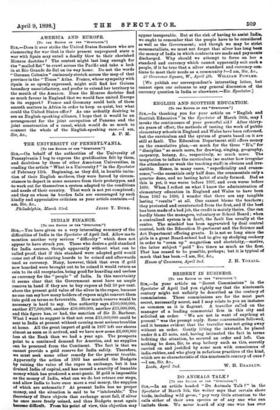ENGLISH AND SCOTTISH EDUCATION.
[To THE EDITOR OF THE " SPECTATOR."' SIR,—In thanking you for your article on "English and Scottish Education" in the Spectator of March 26th, may I invoke the continuance of your powerful aid ? After thirty- six years of effort, the methods of testing the work of public elementary schools in England and Wales have been reformed, but the curriculum and the system of grants based on it are still at fault. The Education Department still offers money on the cumulative plan,—so much for the three "R's," for " discipline " so much more, for drawing, singing, geography, carpentry, botany, &c., respectively, so much more. The temptation to inflate the curriculum (no matter how irregular the attendance or weak the teaching staff) is obvious and irre- sistible. Hence, in many cases, "superficiality and evanes- cence,"—the essentials only half done, the ornamentals only a quarter done, and no lasting habit of study formed. Bad as this is yet, it was worse before 1897, and even worse before 1890. When I reflect on what I know the administration of elementary education in England and Wales to have been from 1862 to 1890, I wonder that there are any tangible lasting " results " at all. One cannot blame the teachers ; they protested and counteracted from the first, and if the best has been made of a bad job, the credit is mainly theirs. One can hardly blame the managers, voluntary or School Board ; when a centralised system is in fault, the fault lies usually at the centre. The mischief has been aggravated by dual central control, both the Education Department and the Science and Art Department offering grants. It is not so long since the girls in a great Board-school had to give up studying cookery in order to "cram up" magnetism and electricity,—motive, the latter subject " paid " five times as much as the first. That has ceased to be possible, perhaps; but it is typical of much that has been.—I am, Sir, &c.,
House of Commons, April 2nd. J. H. YOXALL.


































 Previous page
Previous page